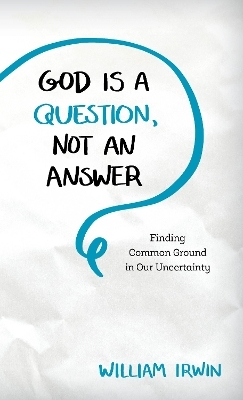
God Is a Question, Not an Answer
Finding Common Ground in Our Uncertainty
Seiten
2018
Rowman & Littlefield (Verlag)
978-1-5381-1588-6 (ISBN)
Rowman & Littlefield (Verlag)
978-1-5381-1588-6 (ISBN)
Uncertainty is the essence of the human condition, and nothing is more uncertain than God. This book aims to unsettle both believers and non-believers as it argues that since neither the existence of God nor the nonexistence of God can be proven, we can find more strength in this common uncertainty than in polarizing belief systems.
Uncertainty is the essence of the human condition, and nothing is more uncertain than God. Yet passions run hot when it comes to God, both among believers and non-believers.
God is a Question, Not an Answer aims to unsettle readers on both sides of the issue. William Irwin argues that because belief occurs along a continuum of doubt and we can never reach full certainty, believers and non-believers can find common ground in uncertainty. Beginning with the questions of what we mean when we talk about God and faith, Irwin shows that from a philosophical perspective, the tendency to doubt is a virtue, and from a religious perspective there is no faith without doubt. Rather than avoid uncertainty as an uncomfortable state of emotional despair, we should embrace it as an ennobling part of the human condition.
We do not have to agree about the existence of God, but we do need to practice intellectual humility and learn to see doubt as a gift. By engaging in civil discourse we can see those who disagree with us as not only fully human but capable of teaching us something.
Uncertainty is the essence of the human condition, and nothing is more uncertain than God. Yet passions run hot when it comes to God, both among believers and non-believers.
God is a Question, Not an Answer aims to unsettle readers on both sides of the issue. William Irwin argues that because belief occurs along a continuum of doubt and we can never reach full certainty, believers and non-believers can find common ground in uncertainty. Beginning with the questions of what we mean when we talk about God and faith, Irwin shows that from a philosophical perspective, the tendency to doubt is a virtue, and from a religious perspective there is no faith without doubt. Rather than avoid uncertainty as an uncomfortable state of emotional despair, we should embrace it as an ennobling part of the human condition.
We do not have to agree about the existence of God, but we do need to practice intellectual humility and learn to see doubt as a gift. By engaging in civil discourse we can see those who disagree with us as not only fully human but capable of teaching us something.
William Irwin is Herve A. LeBlanc Distinguished Service Professor and Chair of Philosophy at King’s College in Pennsylvania. He is the author or editor of numerous books, including The Simpsons and Philosophy, The Matrix and Philosophy, and Seinfeld and Philosophy. His writing has appeared in the New York Times blog The Stone, and he has been interviewed by numerous media outlets including the New York Times, the Los Angeles Times, The Chronicle of Higher Education, USA Today, the BBC, CNN, NPR, and MSNBC. He lives in Kingston, Pennsylvania.
| Erscheinungsdatum | 22.11.2018 |
|---|---|
| Verlagsort | Lanham, MD |
| Sprache | englisch |
| Maße | 145 x 225 mm |
| Gewicht | 336 g |
| Themenwelt | Sachbuch/Ratgeber ► Gesundheit / Leben / Psychologie ► Esoterik / Spiritualität |
| Geisteswissenschaften ► Religion / Theologie ► Weitere Religionen | |
| ISBN-10 | 1-5381-1588-3 / 1538115883 |
| ISBN-13 | 978-1-5381-1588-6 / 9781538115886 |
| Zustand | Neuware |
| Haben Sie eine Frage zum Produkt? |
Mehr entdecken
aus dem Bereich
aus dem Bereich
Neue medizinische Fakten zur Nahtoderfahrung
Buch | Softcover (2023)
Patmos Verlag
CHF 34,90
mit einem Geleitwort von Elke Heidenreich
Buch | Hardcover (2024)
Kösel (Verlag)
CHF 41,95
Wege zur Auflösung von Beziehungs-, Entwicklungs- und …
Buch | Hardcover (2023)
Kösel (Verlag)
CHF 47,60


